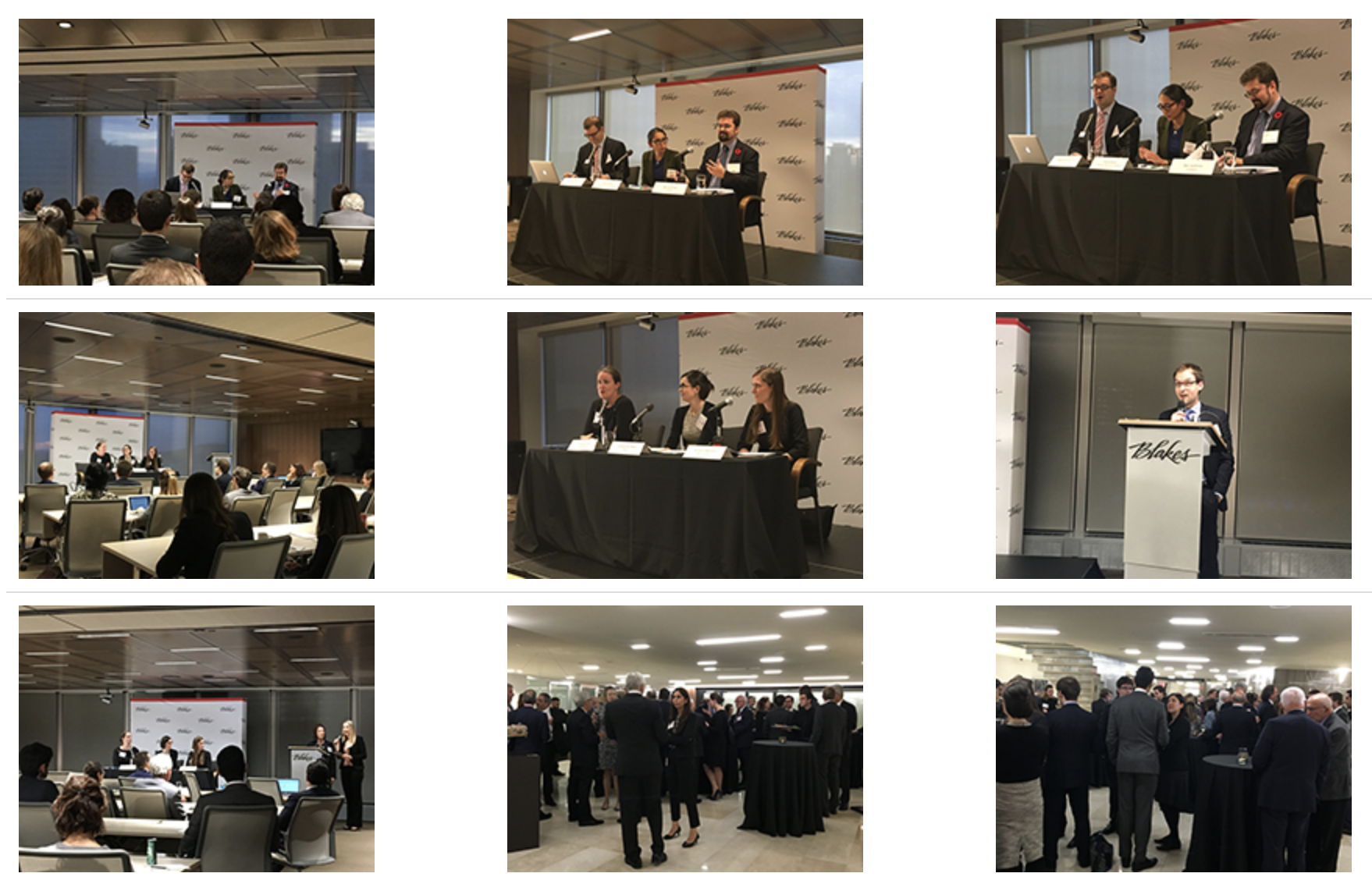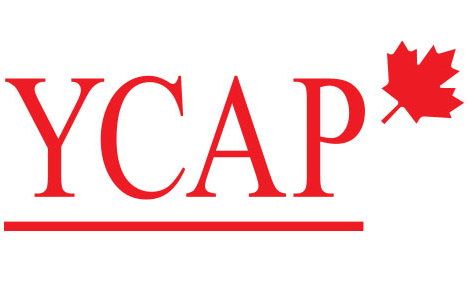28 Mar YCAP 2017 FALL SYMPOSIUM: Panel on building your arbitration practice in international arbitration
On Thursday, November 9, 2017, YCAP (in conjunction with ICC YAF) hosted its Fall Symposium at Blakes, Cassels & Graydon LLP in Montreal which included two panel presentations: (1) Corruption and Money Laundering Related to International Arbitration, and (2) Building your Arbitration Practice. The following is a summary of the second panel.
Building Your Arbitration Practice
Elizabeth Montpetit (Mishcon de Reya, London) and Stephanie Cohen (Cohen Arbitration, New York) spoke on the topic of Building your Arbitration Practice, which was moderated by Laurence Ste-Marie (Woods, Montreal).
The panel opened with a discussion of how the speakers became involved in international arbitration. Ms. Cohen, who now practices exclusively as an arbitrator based in New York, became involved in international arbitration while in Paris. Ms. Monpetit was exposed to international arbitration at Perley-Robertson, Hill & McDougall LLP in Ottawa and gained significant experience while completing the Fox Scholarship in London. Ms. Ste-Marie became involved in international arbitration while working at a leading international arbitration boutique in Paris.
The panel then turned to the fundamental skills necessary to building your arbitration practice. Relevant skills in international arbitration include expertise in resolving substantive and procedural legal issues, navigating difficult factual contexts, as well as knowledge of the enforcement of arbitral awards. For practitioners in cities outside of arbitration hubs, it is beneficial to develop a culture of arbitration in your firm by informing clients engaged in cross-border transactions about the benefits of arbitration. Knowledge of different arbitration rules and nuances between institutions will also assist to best advise clients.
The panelists encouraged junior arbitration practitioners to gain specializations in particular regions and industries. The panel stressed the importance of gaining experience—whether intentional or not—and drawing from your existing expertise; such as language skills and educational specializations. The key to specializing is to strategically capitalize on existing and “inadvertent” specializations, embracing opportunities, knowing how to identify your value, and distinguishing yourself based on your acquired skills.
It is also important to acquire advocacy experience by participating in pro bono cases and training programs. Organizations such as the Foundation for International Arbitration Advocacy (FIAA) and the International Chamber of Commerce (ICC) run training programs each year that focus on advocacy for counsel and teach cross examination techniques. These programs offer valuable opportunities for junior and mid-level lawyers to build their skill sets.
The panel concluded by addressing networking. While networking is indispensable, it can be time consuming to attend the array of conferences, seminars, book launches and training sessions available. Succeeding at networking requires a strategy to build substantive connections. This can be achieved by, for example, getting involved with a young practitioners committee. There are many arbitration groups that exist such as YCAP, the ICC’s Young Arbitration Forum (YAF), the Toronto Commercial Arbitration Society, the ADR Institute of Canada, the International Centre for Dispute Resolution, and the London Court of International Arbitration’s Young International Arbitration Group (YIAG). Apart from training programs, young arbitration practitioners can also become involved as an arbitrator in expedited arbitrations for small cases or by working as a secretary in an arbitral institution.
Prepared by: Brianna Gorence (McGill University Faculty of Law)
Post-Event Report 1
YCAP 2017 FALL SYMPOSIUM: Panel on Corruption & Money Laundering Related to International Arbitration
Allegations of corruption are a growing concern in the international arbitration community. Last November, YCAP and YAF members convened at the 2017 Fall Symposium to discuss the topic of Corruption and Money Laundering related to international arbitration. In a discussion moderated by Vasuda Sinha (Freshfields Bruckhaus Deringer LLP), panelists Pierre-Olivier Savoie (Savoe Arbitration) and Eric van Eyken (Clyde & Co) discussed recent trends and developments on this topic.
The panel began by assessing some of the ways in which corruption impacts various actors in investment arbitration, including the roles of tribunals, respondents, and claimants. As allegations of corruption are in most cases difficult to prove, what is the appropriate standard of proof that tribunals should deploy when dealing with allegations of corruption and money laundering? How might tribunals weigh multiple levels and scales of corruption absent a unified standard? Belokon v. Kyrgyz Republic (“Belokon”) was raised as an example of a case where tribunals and courts differed on the treatment of corruption allegations. Other notable cases discussed included Republic of Croatia v. MOL Hungarian Oil and Gas Company Plc; Djibouti v. DP World; and BSG Resources v. Republic of Guinea.
Similarly, panelists considered how states may use corruption allegations as a defence to claims brought against them. Implicit and explicit references to the legality defence were contemplated, with specific questions around whether such a defence could be raised at the merits or the jurisdictional stage of proceedings. The key cases discussed were Alasdair Ross Anderson and others v. Republic of Costa Rica; World Duty Free Company Limited v. Republic of Kenya; and Niko Resources Ltd. v. Bangladesh.
In contrast, strategic and evidentiary requirements were raised as considerations for claimants finding themselves accused of corruption. For instance, an award stemming from an inherently corrupt relationship is considered in violation of international public policy, and can be set aside, as illustrated in Belokon. Kim v. Uzbekistan was another dispute raised under this sub-topic.
Panelists next addressed how corruption impacts the ethical practices of counsel and tribunal members. The example of Foresti v. South Africa was raised to highlight the importance of disclosure obligations. The ethical duties for tribunals were also examined by the panelists, including what steps tribunals might take sua sponte if they suspect corrupt practices within a relationship giving rise to arbitration. As tribunals are generally reluctant to deal with bribery and corruption issues where they do not form a substantive part of the case before them, it was questioned whether proactive tribunal initiatives to sanction corrupt practices would be curtailed by the principle of ultra petita. The cases discussed included Nova Group Investments, B.V. v. Romania and Hydro S.r.l. and others v. Republic of Albania. The panelists also highlighted state initiatives to dissuade bribery and corruption within arbitral tribunals, including legislation in the UAE and Peru.
The panel concluded with a brief discussion on how issues of corruption risk compromising the finality and enforceability of an arbitral award, including public policy grounds for setting aside or refusing to enforce a corruption-tainted award. As the case in Belokon illustrates, allegations of corruption within arbitration will constitute international public policy grounds for setting aside an award, though the proper standard of review of an arbitral award when the legality of the award is challenged based on corruption remains subject to debate. Further arbitral and judicial developments in this field will continue to impact the manner in which the arbitration community ultimately tackles corruption and money laundering.
Prepared by: Viva Dadwal (McGill University Faculty of Law)
Video recording of 2017 YCAP Fall Symposium (November 9, 2017) – (1) Corruption and Money Laundering Related to International Arbitration and (2) Building your Arbitration Practice. Held in conjunction with ICC YAF and hosted by Blake, Cassels & Graydon LLP at its Montreal office, this event featured two one-hour panels. The event flyer can be downloaded here. Post-event reports summarizing the two panels are available here and available here. The first panel consisted of Eric van Eyken (Hanotiau & van den Berg, Brussels), Pierre-Olivier Savoie (Savoie Arbitration, Paris), and Vasuda Sinha (Freshfields Bruckhaus Deringer, Paris). The second panel featured Elizabeth Montpetit (Mishcon de Reya, London), Stephanie Cohen (Cohen Arbitration, New York), and Laurence Ste-Marie (Woods, Montreal). Concluding remarks were provided by Marek Krasula (ICC/SICANA Inc., New York).
2017 YCAP Fall Symposium Webcast
2017 YCAP Fall Symposium (November 9, 2017):
Held in conjunction with ICC YAF and hosted by Blake, Cassels & Graydon LLP at its Montreal office, this event featured two one-hour panels. The topics were (1) Corruption and Money Laundering Related to International Arbitration and (2) Building your Arbitration Practice. The event flyer can be downloaded here. Post-event reports summarizing the two panels are available here and available here.
PANEL 1
Eric van Eyken, Associate – Hanotiau & van den Berg (Brussels)
Pierre-Olivier Savoie – Savoie Arbitration (Paris)
Vasuda Sinha, Associate – Freshfields Bruckhaus Deringer (Paris)
PANEL 2
Elizabeth Montpetit, Associate – Mishcon de Reya (London)
Stephanie Cohen – Cohen Arbitration (New York)
Laurence Ste-Marie, Associate – Woods (Montreal)
CONCLUDING REMARKS
Marek Krasula, Counsel – ICC/SICANA Inc. (New York)
2017 YCAP Fall Symposium Webcast
2017 YCAP Fall Symposium (November 9, 2017):
Held in conjunction with ICC YAF and hosted by Blake, Cassels & Graydon LLP at its Montreal office, this event featured two one-hour panels. The topics were (1) Corruption and Money Laundering Related to International Arbitration and (2) Building your Arbitration Practice. The event flyer can be downloaded here. Post-event reports summarizing the two panels are available here and available here.
PANEL 1
Eric van Eyken, Associate – Hanotiau & van den Berg (Brussels)
Pierre-Olivier Savoie – Savoie Arbitration (Paris)
Vasuda Sinha, Associate – Freshfields Bruckhaus Deringer (Paris)
PANEL 2
Elizabeth Montpetit, Associate – Mishcon de Reya (London)
Stephanie Cohen – Cohen Arbitration (New York)
Laurence Ste-Marie, Associate – Woods (Montreal)
CONCLUDING REMARKS
Marek Krasula, Counsel – ICC/SICANA Inc. (New York)
________________________________________
Photos from the event

________________________________________
